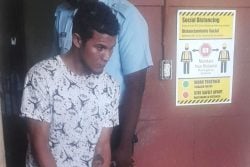Dear Editor,
As we observe 16 days of activism for the elimination of violence against women we must be cognizant of the fact that women and girls living with a disability are at a high risk of becoming victims of non-partner sexual violence. It is important that parents become more vigilant especially if they have a child with a disability; understand their children’s disability, and educate them on protecting themselves where possible and ensure that their children are in adequate care and protected from all forms of abuse.
A global research by John Moores University Centre for Public Health in collaboration with the WHO Centre for Violence Prevention and the WHO Department of Violence, Injury Prevention and Disability published two systematic reviews in the Lancet in 2012. The researchers concluded that overall children with disabilities are almost four times more likely to experience violence than non-disabled children. The review indicated that children living with a disability are 2.9 times more likely to be victims of sexual violence. Children with mental or intellectual impairments appear to be among the most vulnerable, with 4.6 times the risk of sexual violence than their non-disabled peers.
Unfortunately, we don’t have the statistics readily available locally. ChildLinK operate its Child Advocacy Centres (CAC) in four Regions which offer counselling services to children who were sexually abused. At our CACs we have encountered and offered services to several children who displayed symptoms of a disability. Our CACs noted two observations: a lack of information about sexual abuse on the part of the parent and the inability of the child to identify their private parts by their correct names and sexual abuse. Parents of children with a disability must learn ways to teach their children about sexual abuse. Though some of these children’s learning may be a bit delayed, parents must become an expert on their children. This will help you to understand their ability to learn and ways to communicate information about appropriate and inappropriate touches and other child sexual abuse matters. In the instance where a child may have a severe form of disability the parent must try their best to not leave the child unsupervised. Examine your child for marks of violence or behavioural change.
Some children living with some forms of disability can be very physical where they would hug, kiss and touch family members or random strangers and this places them at a higher risk. For example one case referred to our CAC for forensic interviewing was a victim of child sexual abuse who displayed symptoms of severe autism and would continuously try to hug, kiss or hit the interviewers. Perpetrators prey on these children and when a child is physical it makes the grooming process and access to the child easier. They are highly likely to easily become victims and due to this fact it is critical that these children are properly supervised.
Parents and adults who have responsibility for children with a disability need to educate themselves about disabilities and also need to recognize and pay keen attention to the child’s behaviour and identify what makes your child vulnerable. Where possible, teach your children how to protect to themselves. Many children living with a disability often suffer in silence because they are unable to communicate the events of their abuse. Therefore, parents and adults have to ensure that if they have to leave their child in care of someone else that they are with someone who is trustworthy. Remember, it is family members and friends who have easy access to your children that are mostly likely to abuse children. The CACs are not yet equipped with the skills to provide emotional support to child sexual abuse victims with moderate to severe disability; and whilst ChildLinK aims to build this capacity in the CACs, greater emphasis must be placed on preventing gender-based violence against children with disability.
ChildLinK, in collaboration with the Step by Step Foundation, through its One Life Too initiative, is working with parents of specifically children living with mild autism in helping them to understand their child’s disability and to understand how to better care for and safeguard them. This initiative also places a focus on ensuring that the children are developing socially helpful relationships and are being taught about ensuring their safety.
Remember we all have a responsibility first and foremost to care and support all children.
For further information Email: sthomas@childlinkgy.org
Yours faithfully,
Shaquita Thomas
Communications Officer
ChildLinK Inc




